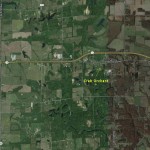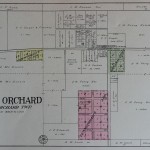Crab Orchard, the village in section 19 of the township bearing the same name, was a natural point for a settlement to grow. The old Lick road from Equality brought settlers by the thousands to the new country. Worthen trail made a well-traveled crossroads in 1821. Two years later the families of Corder, Davis, and Parks built Coal Bank church. Stephen Stilley built a water mill a little to the northwest. Hugh Parks opened his log cabin store in 1836. The inviting country did the rest, and farms filled the neighborhood.
 The village dates from about 1851, and the store kept by Norman and Erwin. A post office was established August 18, 1853 with Benjamin F. Ensminger in charge. The second steam mill in the county, for both grist and lumber, was built at Crab Orchard in 1854 by the brothers-in-law, Erwin and Furlong. Both James M. Furlong and Robert P. Erwin served the county as tax collector before the sheriff was assigned that duty in 1843. Robert Erwin secured the appointment as postmaster, and Hiram McClaskey opened a blacksmith shop. The millers opened a general store in 1857 and ten years later the village was incorporated.
The village dates from about 1851, and the store kept by Norman and Erwin. A post office was established August 18, 1853 with Benjamin F. Ensminger in charge. The second steam mill in the county, for both grist and lumber, was built at Crab Orchard in 1854 by the brothers-in-law, Erwin and Furlong. Both James M. Furlong and Robert P. Erwin served the county as tax collector before the sheriff was assigned that duty in 1843. Robert Erwin secured the appointment as postmaster, and Hiram McClaskey opened a blacksmith shop. The millers opened a general store in 1857 and ten years later the village was incorporated.
The mill was the center of town, standing on the north side of the road in a row of stores. The first mill had no doors, and those with the inclination found it easy to get their grist at night and leave no payment. Corn and wheat and flour were stolen so frequently that the name “Steal-easy” was attached to the town.
Henry Gray and Basil Holland owned Crab Orchard mill in the late sixties. It burned thirty years later, but another mill was built. Crossley and sons, and John H. Farris were other owners of the mill.
Crab Orchard was fortunate in its early doctors, general practitioners whose lives were models of
service. Among them were James N. Beasley, John Huddleston, and Martin M. McDonald. The last two were incorporators of Crab Orchard Academy, and Doctor McDonald was a member of the legislature. Dr. James M. Fowler began practice at Crab Orchard as an assistant to Doctor McDonald, and served the county as superintendent of schools and as representative at Springfield.
Among the merchants of Crab Orchard was Thomas Bones a representative of the English settlement that distinguished early Edwards County. His parents came from Sussex with their six year old son and joined their fellow countrymen in the towns that set a high standard of culture and living conditions for early Illinois. The son was a farmer, druggist, and general merchant at Crab Orchard after his return from the Civil war.
Crab Orchard had the first Grand Army of the Republic post in the county. It was organized September 11, 1866, two months after the first state convention of the order. This post was active until 1871. Its successor, J. L. Parks post 518, was chartered July 1, 1885. Eight members remained on the rolls when the charter was surrendered in 1914.
James L. Parks, for whom the second G. A. R. post was named, was captain of Company G, 110th Illinois infantry. At the muster in November 1862 he was elected second lieutenant by the Williamson county men composing the company, and his promotion came after active service. Captain Parks was killed in the assault on Fort Hill at Vicksburg May 18, 1863. His uncle, Felix M. Parks, was sergeant and his cousin, William A. Parks, a private in the same company. Captain Parks’ father was Lewis Corder Parks the storekeeper at Crab Orchard. His grandfather was Hugh Parks who had the first store in the neighborhood and was a lieutenant in the Black Hawk war. His great-grandfather was one of the riflemen at the Revolutionary battle of King’s mountain, so the Parks missed none of our wars. Three generations of the family kept store in Crab Orchard.
See also, Steal Easy History
(Extracted from Pioneer Folks and Places, Barbara Barr Hubbs, 1939, on sale at the Williamson County Museum)

